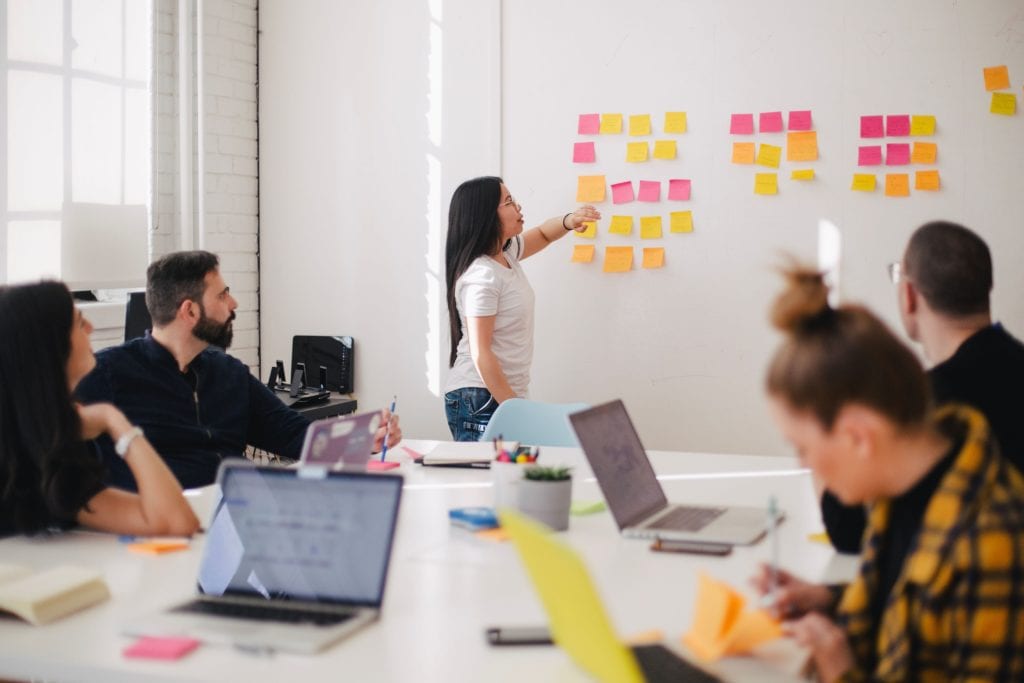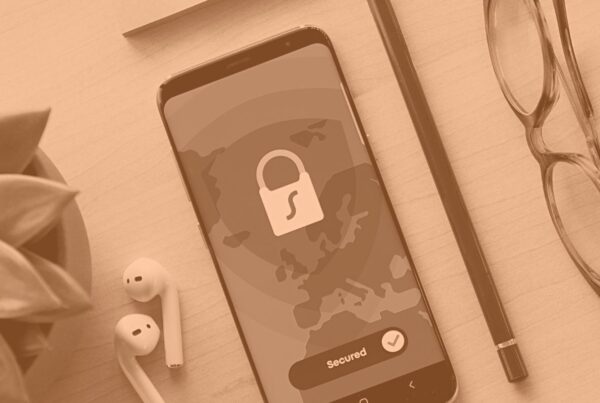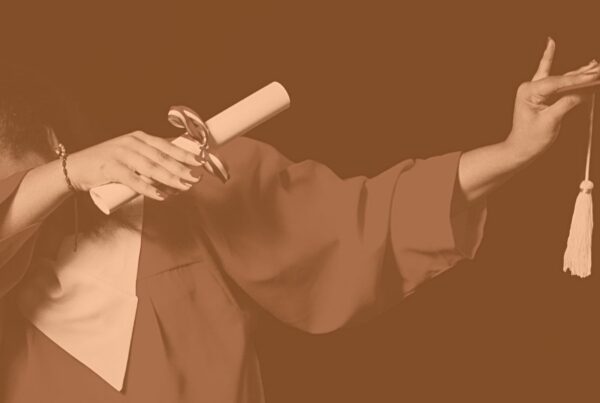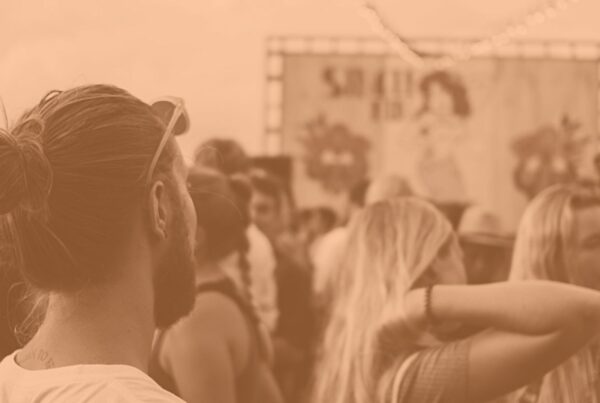There’s no time like the present to reflect on the future of events. Was that too meta? Because what we really mean is – what will define the event team members of the next decade? With yet another decade coming to an end soon, the team behind Event Brew decided to put their heads together. And, of course, have a conversation about what they think will change in our industry when it comes to teams. How have things changed thus far? And how will they progress in the next decade?
These are only two of the questions our lovely hosts seek to answer. Because Will Curran, Nick Borelli, Thuy Diep, and Dustin Westling have quite a bit to say about the future of events! Are you curious to know how they perceive the future? And are you ready to have your opinions about what 2020 will bring challenged? Then press play, and let’s get brewing!
Click here for the full audio transcription.
 The Future Of Events: Looking Back First
The Future Of Events: Looking Back First
Before tackling the topic of the future of events, our hosts first think back 10 years ago. What are some categories and roles that didn’t exist? What did the past decade bring that is new?
Ten Years Ago…
Will speaks of the advent of “social media”, while Dustin brings up Dustin “definitely more safety, security dedicated positions”. And Will also adds that “all the video engineer’s role within the general session has really expanded to lots of different roles. You have a person who charged with content, someone’s in charge of like these triple wide 30 by 10 screens. Like none of that existed before”. And picking up on content, Nick says that “just the idea that the ways that content creators work hand in hand with event professionals. Before that was just basically PowerPoint, that’s it”.
“I’d say you see more hosting concierge services, more attendees services now than you would have 10 years ago”, adds Dustin.
Technology! Technology!
“Obviously we had some big changes in the last 10 years as far as technology is concerned”, says Nick. “And then just the general level of sophistication of live events has advanced. So for the last 10 years, maybe there was let’s say five or six or seven different positions that you would never find on an event team. We should expect not the equivalent seven or 10 new ones, but you know 21 or 30 potentially new positions if we were to run along those lines. And if technology is the disruptor that is focusing these things”.
“I think the biggest burden on event designers, strategists, planners, and even implementers has been these huge leaps in technology”, he continues. “To the degree that most people in the events industry feel like we’re behind the eight ball. As far as industries are concerned, we’re not on the cutting edge of implementation of technologies”.
The Future Of Events: Looking Forward
Still On Technology
“So on the technologist side, I think every new position that we’re going to talk about is probably going to evolve from a position that exists already”, says Dustin. Will chimes in when it comes to AV companies: “I think the AV company is going to evolve. And I think specifically within an AV company, the technical director position who usually is kind of limited almost usually to the general session, just to kind of manage all the technical aspects. They’re going to now get pulled out of the general session and maybe that technical director position will stay there. But now they’ll become this technical producer, as somebody who can manage all your tech and kind of tell you all the tech stuff as well”.
“It wouldn’t shock me if in five to 10 years there was somebody on my team whose job was to engage and work with tech companies to get the most innovative and the best product to our clients”, adds Dustin. “So I can see this being something that could exist within agencies and production houses”.
In Comes Sustainability
We can’t look at the future of events without talking about sustainability. ” We need someone who’s focusing just on sustainability. I mean we’re talking about how it’s such a big focus, such a big trend and how it needs to be it. It seems like right now it’s just kind of tacked onto operations roles or someone who’s just going to volunteer some extra time to be in charge of this, but needing probably its own dedicated role especially as things are going”, says Will.
“I think one thing that it has to be able to do is be cross-departmental”, he continues. “So you know they’re able to go sit in on meetings with the AV team and with the food and beverages team and the venue team and see all the different elements. You know, they kind of use their knowledge of sustainability to ask the questions of, what are we doing, what more can we do? I think also they’re also staying on top of a lot of the trends too. So for example, we have the big trend of getting rid of single-use plastics. But maybe, for example, that bamboo straws are also just as bad. So they would be aware of that stuff”.
Mental Health In The Future of Events
“Mental health is going to be the conversation that we are going to have more than any other conversation when it comes to wellness over the next 10 years”, says Dustin. “They are on the rise for the first time in a long time. Men’s mental health issues are playing a huge role in our world as we know it right now and I think big companies are starting to react to this.
More companies are moving their benefits and wellness plans into a more customized, you get what you need, not what we’re giving you. And those are now starting to include mental health benefits where they didn’t always before and insurers don’t cover so much of what you need to”.
And how would the wellness team member function within the rest of the team? Nick has an idea: “Well if we use this kind of light and we give pauses every 25 minutes, this new study says that like learning is more holistic. It will stick and it will promote this kind of behavior. Great. Next. That’s how I envision this kind of like event team of the future. And I think, is the wellness person weighing in on F and B choices? Yes, they are. Are they weighing in on destinations? Yes, they are. Are they weighing in on the registration process and the stress level of that? Yeah. So if they can have a viable impact on every stage of a live event, then I think that there probably is a value to having that as a team”.
 The Role Of Diversity
The Role Of Diversity
Looking into the future of events, Dustin asks a pertinent question. “Are we ready to have that as a team member or is that still very much a hat?”. Will believes that “it just finds ways to make it more welcoming and open for everybody. That’s what I think a lot about when it comes to diversity. And it seems like one person uses it, but I’m pretty sure it’s more people that could utilize it in the future. And things like for example, subtitles and like all these technological things. I think that can help improve people’s experience to make it more welcoming. We just don’t have anyone who’s focusing on it. So I think a lot of times it ends up being an afterthought rather than a priority”.
Dustin adds that we should focus on “making those opportunities feel just as natural as everybody else’s experience. There’s kind of nothing worse than seeing the food and beverage and the one person that’s got the allergies got the like tightly saran wrap plate at the end with her name on it. That sucks. That person is not having the same experience as everybody else”.
“For me, it’s just understanding each individual and how unique and having that compassion and empathy towards it. And just recognizing that all individuals are different and that can actually be a benefit”, says Thuy. “And so to me, diversity and actually inclusion and if anything internally within the company. That’s really important to me because if it starts with just building that culture and being able to know what’s important to represent where we stand”.
A Feared Subject?
“Sympathy gives them a salad. Empathy gives them something that is equal. And I think that’s a big difference”, says Nick. “And I think if you’re not engaging with people who have that viewpoint, directly and actually actively listening to them and putting your feet in their shoes for a little bit, you would just give them a salad and you’re like, look, I ticked the box”.
“I’d say that we as an industry are in the optics phase right now. I think that it’s really important that we look diverse and we’re not thinking about actually being diverse. I think diversity and inclusion is the most feared words in our industry right now and I think they’re the most misunderstood”, adds Dustin. “There’s been some good traction in the world of inclusion in our world. I’ve really noticed MPI I think has done a really good job with some of their initiatives. And some of it is more about optics, but the name badges that have pronouns on them, which is great. We need to not put the little flags on people. We need to ask them at registration. And it needs to be a part of everybody’s not just those.
Will The Future of Events Include A Scientist?
“I think somebody with a behavioral science background should be part of the experience team moving forward, as clients expect more tangible results for their investments”, says Nick. “I think that there needs to be somebody in the team with a background in behavioral science who works with your experienced designer as to say, well yes, but keep in mind what you’re using right now is the behavioral design trait of scarcity. And here’s how people react to scarcity in this kind of environment. Or the idea of trying to think of cognitive bias. So what you’re trying to get around right now is as the problem of this goal of this event of changing behaviors. And that’s what events exist to do”.
“You are trying to overcome cognitive bias”, he continues. “And if somebody could illustrate that in terms that are real, that have been proven, quote-unquote, as much as you can. I think that those teams would be poised to make larger impacts based less on gut and more on science and data. And I think that you could argue that this person would work hand in hand with a data scientist who could easily have a seat at one of these tables as well. But I think those two would be best friends”.
Risk Manager & Crisis Team Leader
“So we have all this talk of potential safety-related things”, says Will. “I think a lot of times we’re so busy that we don’t evaluate all the risks and what could happen. Instead, we say, that’s not going to happen. I think this is the person who’s going to say this is going to happen, and here’s how we’re going to deal with it”:
Dustin adds that “having this person and having this risk management mindset, it sets us ahead from our competitors. It allows us to go to big businesses and say, we work the way you work. We have the same core certification that you have, and that’s very rare in our industry, but it’s going to be required. And in the next 10 years, health and having a health and safety program is going to be a government requirement. It’s not going to be an option anymore. So, this is the one that I think we’re not going to be able to decide whether we’re going to have, I think this is the one that we’re going to get told to have eventually”.
Conclusions
And that’s a wrap on this week’s conversation about the future of events in regards to teams! Are you excited about the next decade? What are some roles you think will begin emerging? And what about the ones that will slowly disappear? Make sure you share your opinion with us and don’t forget to tune in next week for some more brewing!
Resources
How to Foster Inclusion At Events
The Official 2019 Global Event Forum Report Breakdown!
Planning Sustainable Events: How We Can Solve Global Issues
Event Terms: Jargon, Lingo, Acronyms & Everything In Between!
How A Technical Producer Will Take Your Event To The Next Level
Inclusion In The Event Industry: The Impact Of The Americans With Disabilities Act










